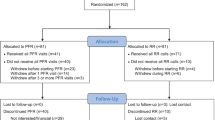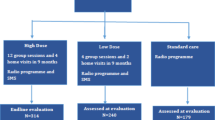Abstract
Preventive intervention programs that address parenting practices and children’s developmental needs early in life have led to positive changes in caregiving behavior and children’s developmental outcomes. However, little is known about the efficacy of such programs among American Indian families. This study tested the efficacy of the strengths-based Promoting First Relationships® (PFR) program in American Indian families living on a rural reservation. Participants were 34 toddlers (10–30 months old) and their primary caregivers. Families were randomized to an Immediate (n = 17) or Waitlist (n = 17) group after a home visit for baseline data collection, which included assessment of observed caregiver-child interactions, caregiver perceptions, and child behavior. After randomization, we delivered the PFR intervention in 10 visits to the Immediate group, with some adaptations based on focus groups with community members and staff input. We analyzed follow-up assessments by implementing multiple regression analyses, controlling for baseline scores and using multiple imputation to handle missing data. Results supported our primary hypotheses: the Immediate group, compared with Waitlist, had significantly higher scores on the quality (p = .011, d = 1.02) and contingent responsiveness (p = .013, d = 1.21) of caregiver-child interactions, as well as on caregiver knowledge of toddlers’ social and emotional needs and level of developmentally appropriate expectations (p = .000, d = 0.58). Caregiver stress and caregivers’ reports of child behavior did not differ significantly. Our results hold promise for additional PFR research in other Native communities.

Similar content being viewed by others
References
Abidin, R. R. (1990). Parenting Stress Index-Short Form. Charlottesville, VA: Pediatric Psychology Press.
Bakermans-Kranenburg, M. J., van IJzendoorn, M. H., & Juffer, F. (2003). Less is more: Meta-analyses of sensitivity and attachment interventions in early childhood. Psychological Bulletin, 129, 195–215.
Barlow, A., Mullany, B., Neault, N., Goklish, N., Billy, T., Hastings, R., et al. (2015). Paraprofessional-delivered home-visiting intervention for American Indian teen mothers and children: 3-year outcomes from a randomized controlled trial. American Journal of Psychiatry, 172, 154–162.
Bigfoot, D. S., & Funderburk, B. W. (2011). Honoring children, making relatives: The cultural translation of parent-child interaction therapy for American Indian and Alaska Native families. Journal of Psychoactive Drugs, 43, 309–318.
Bowlby, J. (1969/1982). Attachment and loss: Vol. 1. Attachment (2nd ed.). New York, NY: Basic Books.
Brave Heart, M. Y. H. (1999). Oyate Ptayela: Rebuilding the Lakota nation through addressing historical trauma among Lakota parents. Journal of Human Behavior in the Social Environment, 2, 109–126.
Briggs-Gowan, M. J., & Carter, A. S. (1998). Preliminary acceptability and psychometrics of the Infant–Toddler Social and Emotional Assessment (ITSEA): A new adult-report questionnaire. Infant Mental Health Journal, 19, 422–445.
Brockie, T. N., Heinzelmann, M., & Gill, J. (2013). A framework to examine the role of epigenetics in health disparities among Native Americans. Nursing Research and Practice, 2013. https://doi.org/10.1155/2013/410395.
Cassidy, J., Jones, J. D., & Shaver, P. R. (2013). Contributions of attachment theory and research: A framework for future research, translation, and policy. Development and Psychopathology, 25, 1415–1434.
Cohen, J. (1988). Statsitical power analysis for the behavioral sciences. Hillsdale, NJ: Erlbaum.
De Wolff, M. S., & van IJzendoorn, M. H. (1997). Sensitivity and attachment: A meta-analysis on parental antecedents of infant attachment. Child Development, 68, 571–591.
Dunbar-Ortiz, R. (2014). An indigenous peoples’ history of the United States. Boston, MA: Beacon Press.
Duran, B., Malcoe, L. H., Sanders, M., Waitzkin, H., Skipper, B., & Yager, J. (2004). Child maltreatment prevalence and mental disorders outcomes among American Indian women in primary care. Child Abuse & Neglect, 28, 131–145.
Enders, C. K. (2010). Applied missing data analysis. New York: Guilford Press.
Frankel, K. A., Croy, C. D., Kubicek, L. F., Emde, R. N., Mitchell, C. M., & Spicer, P. (2014). Toddler socioemotional behavior in a Northern Plains Indian tribe: Associations with maternal psychosocial well-being. Infant Mental Health Journal, 35, 10–20.
Grienenberger, J. F., Kelly, K., & Slade, A. (2005). Maternal reflective functioning, mother-infant affective communication, and infant attachment: Exploring the link between mental states and observed caregiving behavior in the intergenerational transmission of attachment. Attachment & Human Development, 7, 299–311.
Hastings, P., Kahle-Kuipers, S., Fleming, C., Lohr, M. J., Katz, L. & Oxford, M. L. (2019). An intervention that increases parental sensitivity in families referred to Child Protective Services also changes toddlers’ parasympathetic regulation. Developmental Science, 22, e12725.
Kawamoto, W. T. (2001). Community mental health and family issues in sociohistorical context: The Confederated Tribes of Coos, Lower Umpqua, and Siuslaw Indians. American Behavioral Scientist, 44, 1482–1491.
Kelly, J. F. (2012). Promoting First Relaionships: PFR research. Retrieved from http://www.pfrprogram.org/research.
Kelly, J. F., & Korfmacher, J. (2008). Raising a baby. Unpublished manuscript, University of Washington.
Kelly, J. F., Zuckerman, T. G., Sandoval, D., & Buehlman, K. (2008). Promoting First Relationships: A program for service providers to help parents and other caregivers nurture young children’s social and emotional development (2nd ed.). Seattle, WA: NCAST Programs.
Letourneau, N. L., Hungler, K. M., & Fisher, K. (2005). Low-income Canadian Aboriginal and non-Aboriginal parent-child interactions. Child: Care, Health and Development, 31, 545–554.
Libby, A. M., Orton, H. D., Novins, D. K., Beals, J., Manson, S. M., & AI-SUPERPFP Team (2008). Childhood abuse and later parenting outcomes in two American Indian tribes. Child Abuse & Neglect, 32, 195–211.
Luthar, S. S., & Eisenberg, N. (2017). Resilient adaptation among at-risk children: Harnessing science toward maximizing salutary environments. Child Development, 88, 337–349.
Macvean, M., Shlonsky, A., Mildon, R., & Devine, B. (2017). Parenting interventions for indigenous child psychosocial functioning: A scoping review. Research on Social Work Practice, 27, 307–334.
Mejia, A., Leijten, P., Lachman, J. M., & Parra-Cardona, J. R. (2017). Different strokes for different folks? Contrasting approaches to cultural adaptation of parenting interventions. Prevention Science, 18, 630–639.
Morrissette, P. J. (1994). The holocaust of First Nation people: Residual effects on parenting and treatment implications. Contemporary Family Therapy: An International Journal, 16, 381–392.
Nelson, E. M., & Spieker, S. J. (2013). Intervention effects on morning and stimulated cortisol responses among toddlers in foster care. Infant Mental Health Journal, 34, 211–221.
Oxford, M. L., & Findlay, D. M. (2013). NCAST caregiver/parent-child interaction teaching manual. Seattle, WA: NCAST Programs, University of Washington.
Oxford, M. L., Spieker, S. J., Lohr, M. J., & Fleming, C. B. (2016). Promoting First Relationships®: Randomized trial of a 10-week home visiting program with families referred to child protective services. Child Maltreatment, 21, 267–277.
Oxford, M. L., Booth-LaForce, C., Echo-Hawk, A., Lallemand, O., Parrish, L., Widner, M., … CATCH project Team (2019). Promoting First Relationships: Implementing a home-visiting research program in two tribal communities. Manuscript submitted for publication.
Oxford, M. L., Spieker, S. J., Lohr, M. J., Fleming, C. B., Dillon, C., & Rees, J. (2018). Ensuring implementation fidelity of a 10-week home visiting program in two randomized clinical trials. Maternal and Child Health Journal, 22, 376–383.
Rayce, S. B., Rasmussen, I. S., Klest, S. K., Patras, J., & Pontoppidan, M. (2017). Effects of parenting interventions for at-risk parents with infants: A systematic review and meta-analyses. BMJ Open, 7, e015707. https://doi.org/10.1136/bmjopen-2016-015707.
Rothe, J. P., Makokis, P., Steinhauer, L., Aguiar, W., Makokis, L., & Brertton, G. (2006). The role played by a former federal government residential school in a First Nation community’s alcohol abuse and impaired driving: Results of a talking circle. International Journal of Circumpolar Health, 65, 347–356.
Sarche, M., & Spicer, P. (2008). Poverty and health disparities for American Indian and Alaska Native children: Current knowledge and future prospects. Annals of the New York Academy of Sciences, 1136, 126–136.
Sarche, M. C., Croy, C. D., Big Crow, C., Mitchell, C., & Spicer, P. (2009). Maternal correlates of 2-year-old American Indian children’s social-emotional development in a Northern Plains tribe. Infant Mental Health Journal, 30, 321–340.
Sawilowsky, S. (2009). New effect size rules of thumb. Journal of Modern Applied Statistical Methods, 8, 467–474.
Seideman, R. V., Haase, J., Primeaux, M., & Burrs, P. (1992). Using NCAST instruments with urban American Indians. Western Journal of Nursing Research, 14, 308–321.
Sequist, T. D. (2017). Urgent action needed on health inequities among American Indians and Alaska Natives. Lancet, 389, 378–379.
Spieker, S. J., Oxford, M. L., & Fleming, C. B. (2014). Permanency outcomes for toddlers in child welfare two years after a randomized trial of a parenting intervention. Children and Youth Services Review, 44, 201–206.
Spieker, S. J., Oxford, M. L., Kelly, J. F., Nelson, E. M., & Fleming, C. B. (2012). Promoting First Relationships: Randomized trial of a relationship-based intervention for toddlers in child welfare. Child Maltreatment, 17, 271–286.
Stanley, L. R., Swaim, R. C., Kaholokula, J. K., Kelly, K. J., Belcourt, A., & Allen, J. (2017). The imperative for research to promote health equity in indigenous communities. Prevention Science. https://doi.org/10.1007/s11121-017-0850-9.
Sweet, M. A., & Appelbaum, M. L. (2004). Is home visiting an effective strategy? A meta-analytic review of home visiting programs for families with young children. Child Development, 75, 1435–1456.
Van Breukelen, G. J. (2006). ANCOVA versus change from baseline had more power in randomized studies and more bias in nonrandomized studies. Journal of Clinical Epidemiology, 59, 920–925.
van den Boom, D. C. (1995). Do first-year intervention effects endure? Follow-up during toddlerhood of a sample of Dutch irritable infants. Child Development, 66, 1798–1816.
van IJzendoorn, M., Schuengel, C., & Bakermans-Kranenburg, M. (1999). Disorganized attachment in early childhood: Meta-analysis of precursors, concomitants, and sequelae. Development and Psychopathology, 11, 225–249.
Whitesell, N. R., Beals, J., Mitchell, C. M., Manson, S. M., Turner, R. J., & AI-SUPERPFP Team (2009). Childhood exposure to adversity and risk of substance-use disorder in two American Indian populations: The meditational role of early substance-use initiation. Journal of Studies on Alcohol and Drugs, 70, 971–981.
Acknowledgments
We acknowledge, in alphabetical order, the contributions of Colleen Dillon, Abigail Echo-Hawk, Raymond M. Harris, Janet Katz, Odile Lallemand, Sterling McPherson, Katie Nelson, Michael Orr, Anthippy Petras, Jennifer Rees, and John Roll; and the dedicated on-site staff who provided the intervention and collected research data. We are grateful to our tribal partner for collaborating with us on this research and allowing us access to their community and to the families who participated in the project.
Funding
Funding for this research was provided by the National Institute on Minority Health and Health Disparities, P20 MD006871 (Principal Investigators: D.S. Buchwald and J. Roll).
Author information
Authors and Affiliations
Corresponding author
Ethics declarations
Conflict of Interest
Monica L. Oxford is the Director of the University of Washington Parent-Child Relationship Programs at the Barnard Center, which provides materials and training for Promoting First Relationships® on a fee basis. The other authors declare that they have no conflict of interest.
Ethical Approval
All research reported herein received both tribal approvals and university Institutional Review Board approvals. All procedures performed in this study were in accordance with the ethical standards of the institutional and/or national research committee and with the 1964 Helsinki declaration and its later amendments or comparable ethical standards.
Informed Consent
Informed consent was obtained from all individual participants included in the study upon which this manuscript is based.
Additional information
Publisher’s Note
Springer Nature remains neutral with regard to jurisdictional claims in published maps and institutional affiliations.
Rights and permissions
About this article
Cite this article
Booth-LaForce, C., Oxford, M.L., Barbosa-Leiker, C. et al. Randomized Controlled Trial of the Promoting First Relationships® Preventive Intervention for Primary Caregivers and Toddlers in an American Indian Community. Prev Sci 21, 98–108 (2020). https://doi.org/10.1007/s11121-019-01053-x
Published:
Issue Date:
DOI: https://doi.org/10.1007/s11121-019-01053-x




